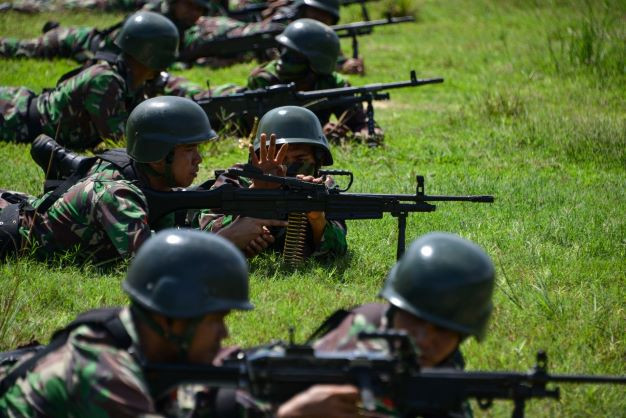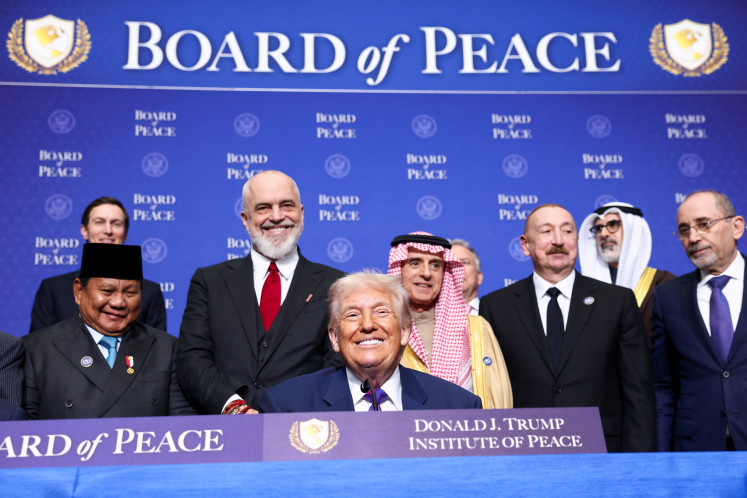Popular Reads
Top Results
Can't find what you're looking for?
View all search resultsPopular Reads
Top Results
Can't find what you're looking for?
View all search resultsQuo vadis TNI reform?
The plan goes against the military reform agenda this nation embarked on 25 years ago. Among the major items of that agenda was a gradual phasing-out the TNI’s territorial functions.
Change text size
Gift Premium Articles
to Anyone
O
ut of the blue, the government recently announced a plan to form new regional military commands (Kodam) in each of the country’s 37 provinces, citing the need to strengthen the national defense system, which should involve both military and civilian elements, including the police and local governments.
The initiative came from Army chief of staff Gen. Dudung Abrurachman, and it unsurprisingly won approval from Indonesian Military (TNI) chief Adm. Yudo Margono and Defense Minister Prabowo Subianto. Both Dudung and Yudo will retire at the end of this year, while Prabowo will automatically leave office when the current administration’s term ends in October next year. The formation of the new Kodam will leave a monumental legacy, but perhaps a heavy burden for their successors.
Not only is the proposal untimely amid Indonesia’s efforts to recover from the devastating pandemic and ahead of a potential global recession. More importantly, the plan goes against the military reform agenda this nation embarked on 25 years ago. Among the major items of that agenda was a gradual phasing-out the TNI’s territorial functions.
Supervised by the Army chief, the military territorial function covers the regional level, stretching from the Kodam to the village level, which is handled by non-commissioned officers assigned to villages and subdistricts. During the New Order the military territorial command worked to support the sustainability of the regime through operations to maintain security and order, in which criticism of the government, let alone dissent, was deemed intolerable.
The fall of the New Order in May 1998 was followed by sweeping reforms that included separation of the military and police roles. The military would focus on national defense and threats from external forces, while the police would deal with domestic security. For that purpose, the military would return to barracks and uphold civilian supremacy, as in the case of democracies across the world.
The military reform appeared to be on track when in 2004 the military finally surrendered its seats in the House of Representatives, marking its exit from practical politics. The 2004 TNI Law affirms the military reforms, banning active personnel from holding civilian posts except in institutions where a military presence is unavoidable such as the Defense Ministry, National Disaster Mitigation Agency (BNPB), Search and Rescue Agency (Basarnas), Maritime Security Agency (Bakamla) and National Cyber and Encryption Agency (BSSN).
But we have seen the commitment to completing the military reforms agenda wither. Perhaps this has something to do with President Joko “Jokowi” Widodo’s predilection for former military generals as his key aides. Those ex-generals contributed much to his catapulting into the presidency in 2014 and being reelected in 2019.
Investigations into past human rights violations that involved the military have moved at a snail’s pace, despite his campaign promise to uphold justice for the victims of atrocities. The President’s instruction for a non-judicial settlement of 12 crimes against humanity just as he completes his second term looks like the best deal he can offer, as he may be reluctant to anger the military.
How Jokowi will respond to the initiative to create a Kodam in each of the country’s 37 provinces will further test this long-standing mutualism. Given his good ties with Prabowo, Yudo and Dudung, however, Jokowi is likely to support the plan, regardless of the criticism that mounted as soon as Prabowo made it public on Feb. 11.
Indeed, the TNI is facing promotional logjams, which has resulted in hundreds of “non-job” middle-ranking officers and has attempted organizational restructuring to cope with the problem. The formation of new Kodam will certainly help solve the issue, but the cost of the policy will exceed its benefits.
The new Kodam will extend the chains of command, while rapid deployment of troops matters in time of war or national threats. The formation of three Joint Regional Defense Commands, which combine the three services, was actually a breakthrough, but the new Kodam may render them ineffective.
The most worrying scenario, however, is the potential of politicization of the new Kodam ahead of the 2024 elections.











